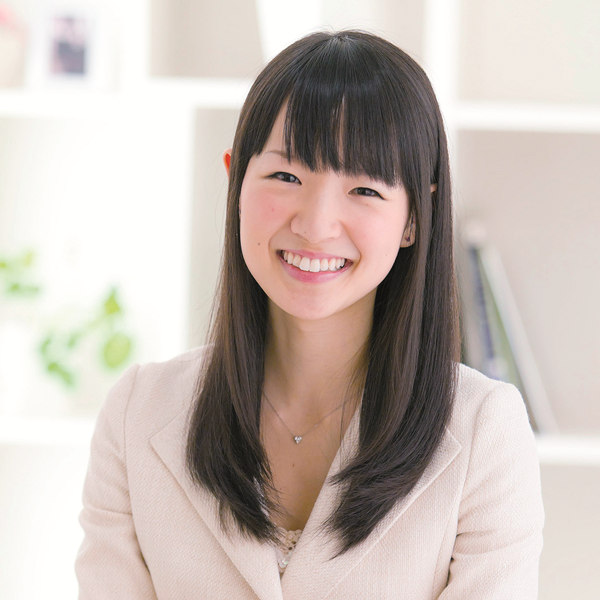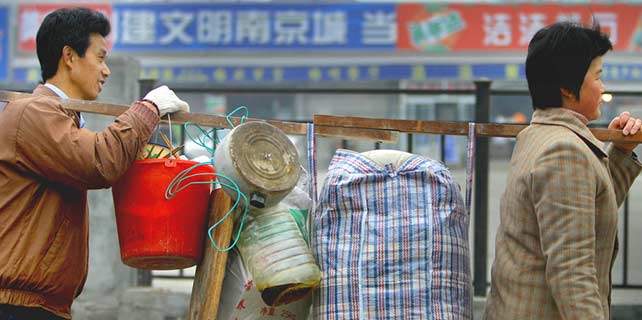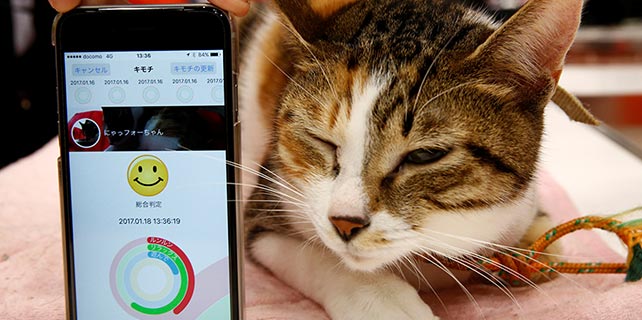Queen of clean
 |
|
Marie Kondon offers cleaning tips to the whole world through her books. Provided to China Daily |
Some people do not just build a brand, they are the brand.
Steve Jobs' black turtlenecks personified the Apple Mac user's inner artist. Donald Trump's larger-than-life personality is the bedrock for his eponymous business empire. And Marie Kondo is as compact, minimalist and poised as the homes rendered tidy by followers of her manifesto.
One of the world's top organizing consultants, Kondo is a best-selling author and cleanliness guru. Her company, KonMari Media, is on a mission to organize the world, one household at a time, and in her homeland of Japan her message has made her a celebrity. Internationally, she has gone on to "konvert" millions to her cause.
Two of her four books on eradicating household clutter have been published in English and have become global smash hits.
Her first, The Life-Changing Magic of Tidying Up, has sold almost 6 million copies worldwide since its release in 2011. In the United States, it has sold 1.5 million copies and has stayed on The New York Times best-seller list for more than two years.
On the internet, Kondo's fans can be enthusiastic. They form support and advice groups, share photos and post updates on their tidying progress. Others dissect her philosophy, interpreting and adapting her manifesto to everything from sock folding to human relationships.
The more extreme followers — self-proclaimed Konverts — use her name as a verb. To "kondo" is the act of vigorous, heartfelt decluttering, as in such phrases as: "I'm just kondoing my closet."
From Kondo's writing, her personality can be perceived as quite intense and forthright.
"I think some readers do get that impression of me," she replied in Japanese, through an interpreter, "because I use a lot of declarative sentences in my books."
But Kondo, in the flesh, does not come across as intense. Petite, charming and demure, she seems not far removed from the distilled, Zen-like serenity she portrays in photographs. She sits straight-backed, her hands folding and refolding in her lap.
Getting information about her past is not easy. Outside of what she writes about herself in her books and blogs — an anecdote here, a TV interview there — she values her privacy.
"Having always been a recluse, obsessed with organizing, such privacy is important to me," Kondo told China Daily.
"It's been going well so far, particularly overseas. I don't get recognized in public so much just yet." She smiled, adding: "It's fine."
So, not quite your typical cult leader. And yet, according to Kondo's own story of how her life's work began, her mission may indeed be divinely inspired. She was only 16 when she believes a god spoke to her.
To some, the idea of a deity offering cleaning tips might be disconcerting, but for Kondo, tidying really has been her life's calling. At age 5 she was leading her mother in tidying the house. Later, in school, she preferred being class monitor to playing outside, spending recess organizing the classroom bookshelves.
The need to tidy became an obsession. She threw away family keepsakes and palmed off unwanted items as "gifts" to her younger sister.
But the heavens intervened when Kondo, trash bag in hand, decided to throw out everything in her bedroom. She looked at the mess and fainted.
When she awoke two hours later, there was a voice in her head. "Look at things more carefully," it said.
"I don't know whether it was an actual voice or a feeling that came from (within) myself," Kondo told The Times of London in January 2016. "I believe it was the god of tidying … That was the moment when I had my inspiration."
From that point, the trajectory of her work shifted. No longer was it about ditching the bad. Instead, the focus was on cherishing the good.
All items kept or disposed of would be thanked — even socks, before being folded, must be congratulated for their hard work. But only those things which are used or "spark joy" (tokimeku) are allowed to stay: Be it clothes or significant others.
"I believe (the method) applies to all aspects of real life," Kondo said, "because by cleaning your physical space you're honing your sensitivity in understanding your situation. This also applies to human relationships.
"A lot of my clients have really transformed the way they relate to their friends — and one of my clients broke up with a partner who wasn't quite working out."
Today, married and with a 1-year-old daughter, the idea of casting off people who fail to inspire joy perhaps has less appeal than when she was 19 and had just started making money tidying for clients. That was while studying at Tokyo Woman's Christian University.
The Life-Changing Magic of Tidying Up began as a stopgap: With so many customers needing her expertise, Kondo thought that she could help them go it alone with a simple guidebook.
"My method was pretty much established by the time I began writing the books," she said. "You could say it was 12 years in the making."
Writing that book took just three months.
"What happened was, I went to a seminar to learn book writing. And at the end of the seminar there was a presentation where you needed to pitch an idea for a book. There were about eight editors present. In fact, I won the competition, so that garnered a lot of interest."
When the book was launched in Japan, it was the right time — but for the wrong reasons. It was during the aftermath of the devastating nuclear accident and tsunami that struck Japan in March 2011.
The book beat all expectations. According to Kondo's editor, a profitable, popular book on the art of tidying-up might sell 300,000 copies. When it sold more than 1 million in Japan, she was "very surprised". People, it seemed, were looking to find order amid the chaos.
In the US, the English-language translation was published in 2014. It was lost in obscurity until a journalist from The New York Times wrote how she used the book's methods to clean her apartment. Almost overnight, Kondo crossed the Pacific.
Other translations followed, including Czech, Romanian, Korean and Vietnamese. And a Chinese-language edition was published recently.
"In Taiwan there has been really great feedback and my book has been doing really well," Kondo said. "But when it comes to the Chinese mainland, relative to the population, I think it could be doing much better."
In Japan, the business of training professional KonMari consultants began in 2014 and is well established. A roll-out in the US is now under way.
Becoming a consultant involves an intensive three-month course of seminars. That is followed "by an actual monitored test where you go to a client's home and write a report based on the experience. Then there will be a final certification exam," Kondo said.
The price of the course in Japan is 350,000 yen ($3,000). And even with a 30 percent failure rate, it has proved popular: Currently around 120 KonMari consultants work in the country.
Kondo anticipates that over the next year or so, courses will be extended to other English-speaking countries where her book sales have been high.
The next step is technology. A recently released KonMari app helps users check off what they have tidied, then share it with the global community. "Sort of a guideline to keep you on track," she explained.
"I am very much inspired by Uber and Airbnb," Kondo said, referring to the ride-hailing giant and home-stay network.
"I've always been inspired by people engaged in startups and new ventures because they're launching what inspires joy for them, so their energy always inspires me."
















